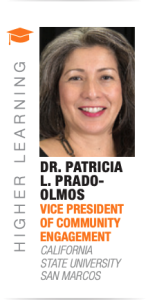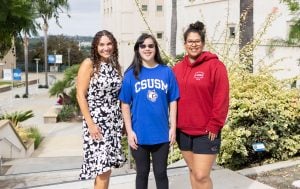New CSUSM program opens doors for students with intellectual disabilities
 Rebecca Brooks arrived at Cal State San Marcos with 16 years of experience as a special education teacher – and with a dream.
Rebecca Brooks arrived at Cal State San Marcos with 16 years of experience as a special education teacher – and with a dream.
Almost since the day she was hired as a professor in the School of Education in 2015, Brooks has aspired to establish a program that would give students with intellectual disabilities as close to a normal college experience as possible.
A couple of years into her tenure, she began talking to CSUSM colleagues about it. In 2020, during a sabbatical, she started working on it. And now, nearly a decade later, that dream is a reality.
Last fall, Brooks officially established the Aspiring Scholars program, a four-year initiative for students with intellectual disabilities who aren’t pursuing a degree but are seeking an inclusive college experience. Four students are part of the first cohort of this program in which they learn and grow alongside the CSUSM community while earning a certificate in higher education career studies and skill development.

“I’m thrilled that we are able to offer this program at CSUSM,” Brooks said. “It’s something that I’ve wanted even prior to working at CSUSM. So being able to create a pathway for students when they finish high school to attend a four-year university is very exciting and much needed.”
Aspiring Scholars falls into the category of a nationwide trend called Inclusive Postsecondary Education (IPSE), which is designed for students with intellectual disabilities (and of college age) to continue academic, career and technical, and independent living instruction to prepare themselves for employment. CSUSM has joined more than 300 degree-granting institutions in the United States that offer IPSE programs, which might sound impressive until you consider that the country contains more than 4,300 such institutions.
In California, the ratio is even more dire, as only five four-year universities in the state offered IPSE programs in 2022. Brooks is trying to help change that, and the state grant that’s funding her program involves a partnership with five other California State University campuses: East Bay, Long Beach, Northridge, San Francisco and San Jose.
Brooks pointed to data showing that only 3% of adults with intellectual disabilities make a living wage in California, whereas a survey by Think College – a national research center based at UMass Boston for students with intellectual disabilities – found that 73% of respondents had a paid job one year after completing an IPSE.
“It is critical that more programs like this be developed and offered to students,” Brooks said.
The four students in the inaugural cohort – Joshua Corder, Roman Martens, Tammy Tang and Alex Vaghefi – are participants in a program that has been tailored to their individual needs. Guided by peer mentors, students are required to take at least two classes per semester, but they can choose any discipline they want based on their interests and career goals. In Year 2, an internship component will be introduced to offer the students an opportunity to gain skills and experiences. And Aspiring Scholars provides plenty of chances for students to get involved in campus life, whether it’s clubs, university events or sports competitions.
Brooks said the first year of Aspiring Scholars has exceeded her expectations, in large part because of the support she has received from faculty and staff across campus. She anticipates that the number of students will remain at roughly the same level for Year 2, but she plans to apply for additional funding that will allow the program to build on itself and become more sustainable.
“I’m excited to see it grow,” she said.
